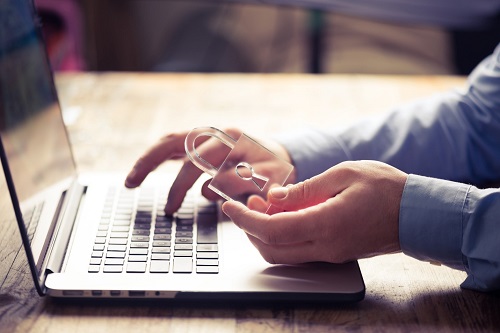Five Tips to Stay Safe Online
In this day and age, much of what we do is online. Whether it’s work or leisure, a lot of time is spent on computers and smart phones. With so much time being spent online, it is important to be safe and responsible. This is especially important with the rise of hacking and data leaks. Keep your personal and financial information secure by following these helpful tips.
Create a strong password.
Though this tip seems obvious, a lot of times passwords to online accounts aren’t as strong as they should be. The best way to keeping your personal and financial information safe online is to create unique1 passwords for each of your important accounts. Don’t use the same password for every account. Be sure to include a variety of capital letters, lowercase letters, numbers and special characters to boost your security level.
Play it safe when shopping online.
Nowadays a lot of people spend their time shopping online. Though it is convenient, it’s crucial to be careful while browsing. Be sure the websites you are visiting are legitimate and do your research.2 Look for reviews and scam reports. You should also be on the lookout for sketchy emails that come through your inbox that promote deals and sales that seem too good to be true, because they probably are. Don’t click on strange links, as it can give crooks an opportunity to get into your network.
Clear your cache.
Your cache is essentially the breadcrumb trail that you leave across the internet. It keeps track of the sites you’ve visited and your activity on those sites. If left untouched, your online record can be kept on your devices for a long time. To prevent thieves from hacking into your cache, be sure to clear it regularly.3
Be careful of what you share on social media.
Yes, using Facebook and Instagram is fun and a good way to keep in touch with loved ones. But when it comes to social media, it is a good idea to be aware of how much you share about yourself. Be careful to not overshare4 personal information on your social media profiles. Someone who is looking to steal your identity could use this information to hack into your accounts and it makes it easier for them to pretend to be you. It is also a good idea to keep your profiles as private to outsiders as possible.
Make copies of important records.
If you have financial records or other valuable files online, be sure to back them up.5 If a virus, malware or just a natural malfunction happens, you’ll be prepared. Keeping essential documents secure in another location prevents the permanent loss of the records you need.
The views expressed by the articles and sites linked in this post do not necessarily reflect the opinions and policies of Cash Central or Community Choice Financial® .
Sources:
1Terwillegar, Todd. (2022, May 2). Retrieved from: https://www.liquidweb.com/blog/password-security-best-practices/
2National Cybersecurity Alliance. (2022, Nov 14). Retrieved from: https://staysafeonline.org/resources/online-shopping/
3Bernard, Doug. (2015, Feb 23). Retrieved from: https://www.voanews.com/a/eleven-ways-to-keep-yourself-safe-online/2650658.html
4Velasquez, Manuela. (2022, Dec 23). Retrieved from: https://www.keepersecurity.com/blog/2022/12/23/how-oversharing-on-social-media-affects-your-privacy/
5National Cybersecurity Alliance. (2022, May 1). Retrieved from: https://staysafeonline.org/resources/back-it-up/

 You must have JavaScript enabled to use this site.
You must have JavaScript enabled to use this site.
 For a better user experience consider upgrading your browser.
For a better user experience consider upgrading your browser.

